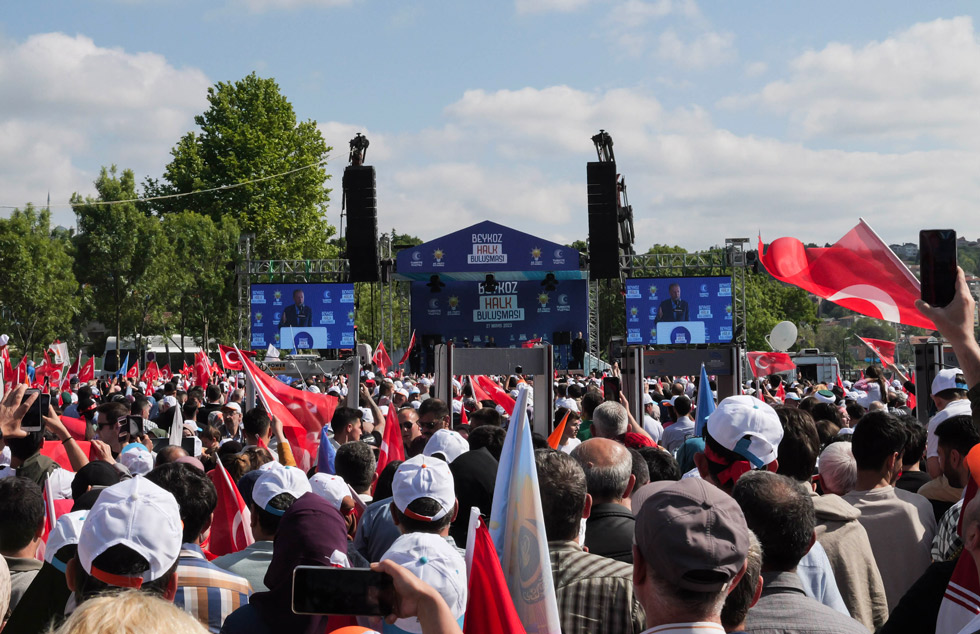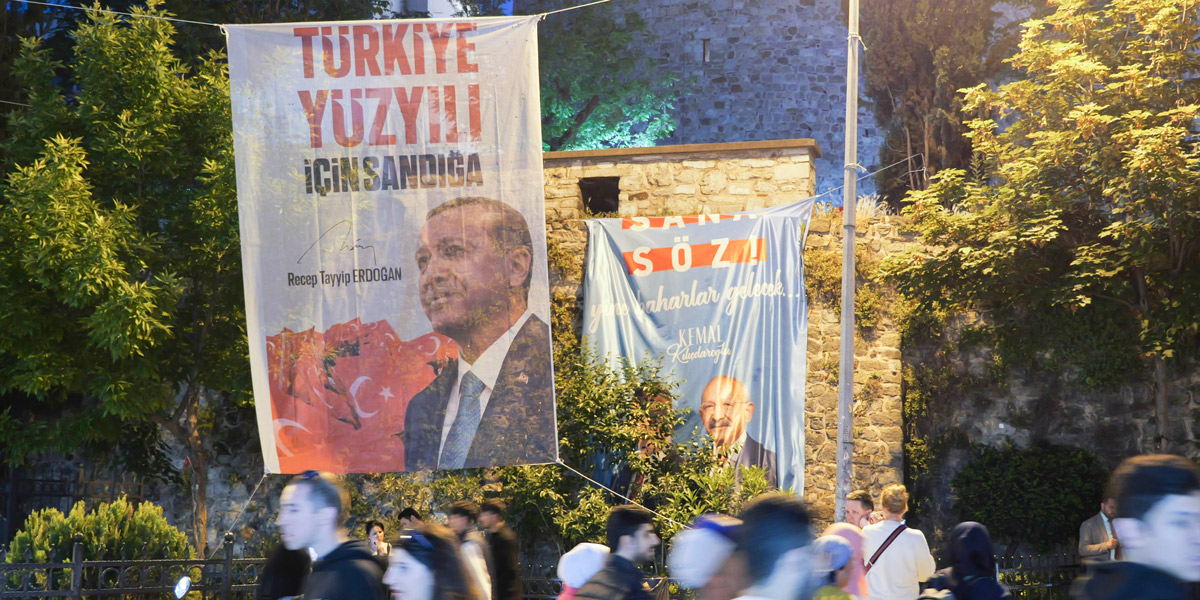Istanbul is an excellent city to understand, at least in part, the progress of the ballot on Sunday 28 May in Turkey, in which the outgoing president Recep Tayyip Erdogan will try to obtain a new mandate by beating the unitary leader of the opposition Kemal Kilicdaroglu, of the centre-left. It is Turkey’s largest and most progressive city, which has long voted for the secular opposition. But even here, for weeks now, everywhere you turn you can see images of Erdogan.
The ballot of the Turkish presidential elections was decided on May 14, when Recep Tayyip Erdogan and Kemal Kilicdaroglu were the two most voted candidates with none reaching 50 percent of the vote. Erdogan had come very close, at 49.5, causing great concern in the opposition, who were convinced they had the advantage, and were severely disappointed.
Erdogan’s good result in the first round was due in part to the fact that his popularity among the Turkish population is still very strong, and in part to the opposition’s difficulties. Some members of the opposition had spoken of electoral fraud, but experts are generally convinced that any irregularities did not have a significant impact: the Turkish voting system, which provides for multiple checks, is relatively secure, and the opposition itself has insisted little on this element.
The ubiquitous flags in support of Erdogan, in Istanbul (Valentina Lovato/Il Post)
But another reason why Erdogan is still so strong in the elections can be seen everywhere in Istanbul: even in a progressive city, the posters of the president and his AKP party are many more than those of Kilicdaroglu and hang in the most visible.
“These are the first elections in Turkey’s recent history in which the entire state apparatus moved in unison in favor of Erdogan,” says Michelangelo Guida, a professor of political science at Istanbul’s 29 Mayıs University, who lives in Turkey for about twenty years and knows Turkish politics very well. The posters are only the most obvious phenomenon. All public institutions are more or less mobilized: some public campaigns promoted by ministries, which in theory would have nothing to do with politics, more or less explicitly mention the slogans of the AKP.
The media, which was largely purged of opposition journalists in recent years, blatantly picks up on government propaganda and creates huge disparities in the treatment of candidates. In April, for example, Erdogan was present on video for 33 hours on the main public television stations; Kilicdaroglu for 32 minutes.

Erdogan’s last rally before the runoff, in the Beykoz District, in Istanbul (Valentina Lovato/Il Post)
Even the Friday prayer sermon, which in Turkey is the same for everyone and is defined by a special government office, seems to subtly pick up on the themes of the president’s electoral campaign. The last one in conversation before the first round he invited the Muslim faithful to promote the values of the traditional family and the “dignity of men and women”, of which the conservative Erdogan obviously proposes himself as the main defender.
Also for this reason, some elements of civil society have tried to mobilize. Many people have joined Oy ve Ötesi (means: Vote and more), an independent association that monitors the vote. Oy ve Ötesi organizes volunteers to be sent to the polling stations as scrutineers: to allow them access to the polling stations, the volunteers are registered as observers of the parties participating in the elections, which rely on Oy ve Ötesi because they do not have enough internal scrutinators. In this way, Oy ve Ötesi can send thousands of people to the polls as observers, and make sure there are no irregularities in the vote.
In the first round, the volunteers who had proposed to Oy ve Ötesi as observers at the polling stations had been around 60,000. There will be more than 220,000 in the ballot, and this is interpreted as a sign that the mobilization of civil society is still strong.
In the runoff, as in the first round, Erdogan is supported by an electoral alliance called the People’s Alliance, and is made up of the AKP, Erdogan’s party, the MHP, a secular nationalist party, and two other small parties Islamists and ultranationalists. Kilicdaroglu is supported by the quasi-united coalition of opposition parties which includes the CHP, Turkey’s historic secular centre-left party, the Good Party (Good Party, nationalist) and four other minor parties, both secular and secular. Whoever wins will become president for the next five years: it is a position of great power, after a constitutional referendum wanted by Erdogan in 2017 had transformed Turkey into a presidential republic.
Practically all the polls taken before the run-off show Erdogan as the winner, even if hardly anyone trusts him anymore: in the first round the same polls gave Kilicdaroglu ahead.
However, this meant that the two candidates ran very different campaigns in the two weeks between the first round and the run-off: Erdogan, feeling he had an advantage, campaigned in more reassuring tones, while Kilicdaroglu moved to the right, seeking the nationalist vote. In particular, he caused much discussion a statement in which he promised to expel from the country the millions of refugees, especially Syrians who are in Turkey.
However, most experts believe it is probable that the dynamics of the first round will be repeated in the ballot, which will lead Erdogan to victory.
The hopes of the opposition focus on elements that are rather difficult to quantify. Some experts argue that the turnout, which was already very high in the first round (87 percent of eligible voters) could increase further, which could favor Kilicdaroglu, who on May 14 had received fewer votes than expected in some regions of the country he is in favour, like the Kurdish-majority south-east. Turnout has increased discreetly abroad, where there has already been voting: of the 3.4 million Turks who live outside the country and have the right to vote, 1.9 million voted for the runoff. They had been 1.7 million in the first round.
Another hope for the opposition comes from the divisions in Sinan Ogan’s far-right party, the candidate who finished third in the first round with about 5 percent of the votes, which are essential. If Ogan himself gave his support to Erdogan, in reality the bulk of his party, including many important leaders, sided with Kilicdaroglu.
But the thing that is probably giving the opposition hope more than anything these days is a YouTube video. It’s a video from the BaBaLa channel, which among other things organizes a very popular talk show with a peculiar format: it invites a politician to confront a live audience of young people who have opposite political orientations to the guest. The young people in the audience ask the guest tough questions, trying to embarrass him in many ways. The show can last from two to five hours and, both due to the duration and the way it is conducted, the host often ends up in great difficulty.
Kilicdaroglu was invited to BaBaLa last week and it went very well. The audience was made up entirely of Erdogan supporters, who asked him very hard and very provocative questions. For four hours he never lost his temper and responded calmly and reasonably. Within days, the show had nearly 25 million views.


